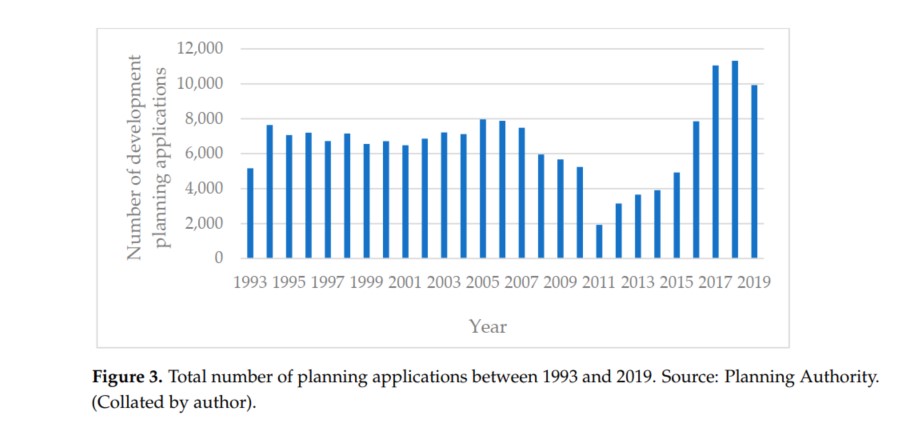The number of granted development permits has skyrocketed since 2013, contributing to a significant increase in urban sprawl, a new study published by the environmental peer-reviewed journal Sustainability shows.
The study charts urban growth in Malta using planning application data from the past 30 years. Besides increased approved permits coinciding with economic and population growth, its findings support the notion that their permit-granting may have been used as a political vote-buying tool.
Authored by four Maltese researchers from the University of Malta, the study used data mining techniques to analyse thousands of development planning applications between 1993 and 2019 to chart trends and urban sprawl.
The study found a particular increase in granted development applications resulting in urban growth since the post-2013 construction boom. It also found that outside development zone permits and permits granted despite a case officer report for their refusal increased before elections.
Discussing the latter findings, the researchers said the results “support the hypothesis that land development and the institutions regulating it are used as a political mechanism by the incumbent government to garner votes during elections.”
The researchers found that while there was a decrease in the share of granted permits that contributed to urban sprawl, “the absolute number of granted development planning applications resulting in growth has increased, particularly in the last construction boom (post-2013).”
It concluded that urban growth shows that “the construction industry is closely linked to the islands’ economic cycles and changes in population,” noting a particular slump in 2011.

The absolute number of Planning Applications has skyrocketed following a government change and growths in the economy and population, the researchers found – Photo: Sustainability Study
“The spike in development-planning application permits in the last few years corroborates the observed construction boom,” they said. They noted how economic and population growth alongside a relaxation in planning policies had been identified as contributing to the trend.
The study also looked at the number of planning applications granted in ODZ areas, using linguistic and data analysis to determine the ones contributing to urban growth. Since the 90s, a steady share of over 10% of applications were granted on ODZ.
In particular, 2017 and 2018 were identified as the years with the highest numbers of such permits. The findings led the researchers to suggest a study into “the effectiveness of the ODZ designation and assessing whether this zone is fulfilling its raison d’être in conserving rural areas has become a transitional zone for development.”
Additionally, the study recommended a “standardisation of descriptors in development-planning applications” for improved transparency. The researchers hoped for a more data-driven approach to studying current and future urban planning policy.
The study published in Sustainability was conducted by Andrea Pace, Maria Attard, Michel Camilleri and Gianluca Valentino.
The researchers hail from the Department of Geography, Insitute for Climate Change and Sustainable Development, Department of Computer Information Systems and Department of Communications and Computer Engineering at the University of Malta.













No surprises in this article and is nothing that we hadn’t already suspected but thanks for the confirmation
Well, ultimately – ‘politicians /police used as mafia tool.’